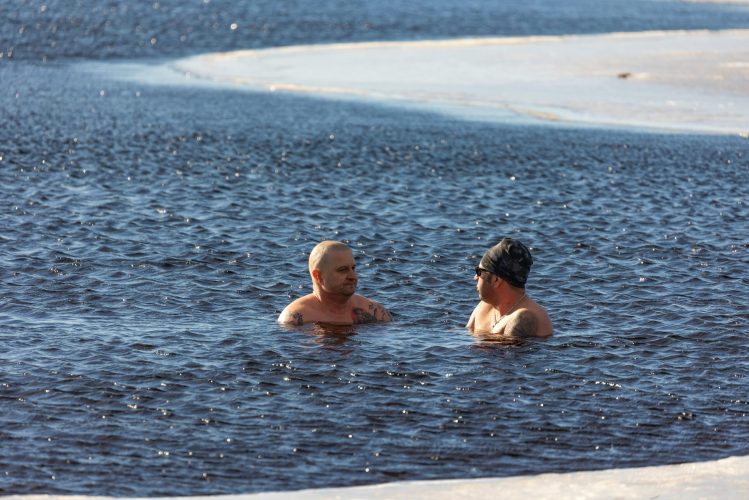On my podcast, Wellness Algorithm: Weight Loss Myths and Truths — Cold Plunge, Oxygen Chambers, Injections and More, I opened up a conversation about weight loss trends that so many of us feel overwhelmed by. From miracle injections to extreme cold plunges and futuristic oxygen chambers, the wellness world is full of bold promises.
I was joined by Dr. Sarge Takhar, with his evidence-based medical insight, and Amandeep Khurana, who shared his lived experience with obesity and GLP-1 therapies. What stayed with me was not the noise of new trends, but the clarity that real change comes back to fundamentals — daily habits and self-compassion.
I’ve heard about Ozempic and tirzepatide everywhere — from celebrity interviews to TikTok videos. It was refreshing to hear Amandeep, who has actually used them, cut through the noise. He told me: “It’s a crutch, a supporting thing. But the primary thing for me is to make sure I’m getting my basics right.”

The science confirms his experience. In the SURMOUNT-1 trial, patients on tirzepatide lost close to 20% of their body weight over 72 weeks (NEJM). That’s extraordinary — results that once required bariatric surgery.
But the other side is just as important. In a 2022 study, people who stopped semaglutide regained two-thirds of their lost weight within a year (PMC). The drugs create an opportunity, but they cannot replace sustainable habits. They open the door, but we still have to walk through it.
I’ve heard about Ozempic and tirzepatide everywhere — from celebrity interviews to TikTok videos. It was refreshing to hear Amandeep, who has actually used them, cut through the noise. He told me: “It’s a crutch, a supporting thing. But the primary thing for me is to make sure I’m getting my basics right.”
The science confirms his experience. In the SURMOUNT-1 trial, patients on tirzepatide lost close to 20% of their body weight over 72 weeks (NEJM). That’s extraordinary — results that once required bariatric surgery.
But the other side is just as important. In a 2022 study, people who stopped semaglutide regained two-thirds of their lost weight within a year (PMC). The drugs create an opportunity, but they cannot replace sustainable habits. They open the door, but we still have to walk through it.

Scrolling through social media, it’s easy to believe that cold plunges and hyperbaric oxygen therapy are miracle solutions for fat loss. I’ll admit, even I was intrigued by the idea that a few minutes in freezing water could “unlock” fat-burning.

Sarge’s take was grounding: “If the treatment just sounds too good to be true, if it’s fast, if it’s effortless… Those are clear red flags to me.”

Scrolling through social media, it’s easy to believe that cold plunges and hyperbaric oxygen therapy are miracle solutions for fat loss. I’ll admit, even I was intrigued by the idea that a few minutes in freezing water could “unlock” fat-burning.
Sarge’s take was grounding: “If the treatment just sounds too good to be true, if it’s fast, if it’s effortless… Those are clear red flags to me.”
After digging deeper, I found little scientific support for these methods as weight-loss strategies. Yes, cold exposure may slightly increase energy expenditure, and oxygen therapy has medical uses for wound healing and decompression sickness. But no strong evidence shows they cause sustained fat loss. At best, they can support mood, stress relief, or recovery — all valuable, but not magic.

This was perhaps my biggest personal shift. Like many people, I wanted to know which diet is “best.” Keto? Mediterranean? Fasting?
The truth I walked away with is simpler — and more freeing. The best diet is not the trendiest or the strictest. It’s the one you can actually live with day after day, month after month.
Science backs this up. The DIETFITS trial compared low-fat and low-carb diets in over 600 adults and found no significant difference in weight loss after a year (JAMA). What mattered most wasn’t whether participants cut carbs or fat — it was whether they stuck with their plan.
That insight made me rethink my own approach. Instead of chasing the perfect diet, the goal should be to build a way of eating that feels natural, nourishing, and sustainable for years — not weeks.

This was perhaps my biggest personal shift. Like many people, I wanted to know which diet is “best.” Keto? Mediterranean? Fasting?
The truth I walked away with is simpler — and more freeing. The best diet is not the trendiest or the strictest. It’s the one you can actually live with day after day, month after month.
Science backs this up. The DIETFITS trial compared low-fat and low-carb diets in over 600 adults and found no significant difference in weight loss after a year (JAMA). What mattered most wasn’t whether participants cut carbs or fat — it was whether they stuck with their plan.
That insight made me rethink my own approach. Instead of chasing the perfect diet, the goal should be to build a way of eating that feels natural, nourishing, and sustainable for years — not weeks.

Another reminder that struck me deeply was how movement shapes identity. One guest put it beautifully: on mornings when he exercises, the rest of the day naturally falls into healthier choices.
That reframed exercise for me. Too often, I’ve thought of it as “burning off” food, almost like paying a debt. Now I see it as something bigger: exercise is about becoming the kind of person who moves. That identity makes it easier to choose nourishing food, to sleep better, and to sustain the habits that matter.

Another reminder that struck me deeply was how movement shapes identity. One guest put it beautifully: on mornings when he exercises, the rest of the day naturally falls into healthier choices.
That reframed exercise for me. Too often, I’ve thought of it as “burning off” food, almost like paying a debt. Now I see it as something bigger: exercise is about becoming the kind of person who moves. That identity makes it easier to choose nourishing food, to sleep better, and to sustain the habits that matter.
Perhaps the most unexpected theme of this conversation was kindness. At one point, I was told: “Self-compassion is tremendously important, and it’s a learnable skill.” That reminder stayed with me.
It also matches what research shows. People who practice self-compassion are more consistent with healthy behaviors, while cycles of guilt and self-criticism often lead to relapse. I realized that the way we talk to ourselves — gently, patiently, hopefully — is just as important as what we eat or how we move.

What I carried home from Weight Loss Myths and Truths: Cold Plunge, Oxygen Chambers, Injections and More was not the allure of a new therapy or a viral trend. It was something quieter and more powerful.
GLP-1s may open doors, but they aren’t the destination. Cold plunges may refresh you, but they don’t replace movement or mindful eating. Diets may differ, but sustainability is the real test. Exercise may not melt kilos instantly, but it shifts who you are becoming. And through all of it, self-compassion makes the journey livable.
In other words: weight loss isn’t about doing everything. It’s about knowing what matters — and practicing it, gently, again and again.

What I carried home from Weight Loss Myths and Truths: Cold Plunge, Oxygen Chambers, Injections and More was not the allure of a new therapy or a viral trend. It was something quieter and more powerful.
GLP-1s may open doors, but they aren’t the destination. Cold plunges may refresh you, but they don’t replace movement or mindful eating. Diets may differ, but sustainability is the real test. Exercise may not melt kilos instantly, but it shifts who you are becoming. And through all of it, self-compassion makes the journey livable.
In other words: weight loss isn’t about doing everything. It’s about knowing what matters — and practicing it, gently, again and again.

| Cookie | Duration | Description |
|---|---|---|
| cookielawinfo-checkbox-analytics | 11 months | This cookie is set by GDPR Cookie Consent plugin. The cookie is used to store the user consent for the cookies in the category "Analytics". |
| cookielawinfo-checkbox-functional | 11 months | The cookie is set by GDPR cookie consent to record the user consent for the cookies in the category "Functional". |
| cookielawinfo-checkbox-necessary | 11 months | This cookie is set by GDPR Cookie Consent plugin. The cookies is used to store the user consent for the cookies in the category "Necessary". |
| cookielawinfo-checkbox-others | 11 months | This cookie is set by GDPR Cookie Consent plugin. The cookie is used to store the user consent for the cookies in the category "Other. |
| cookielawinfo-checkbox-performance | 11 months | This cookie is set by GDPR Cookie Consent plugin. The cookie is used to store the user consent for the cookies in the category "Performance". |
| viewed_cookie_policy | 11 months | The cookie is set by the GDPR Cookie Consent plugin and is used to store whether or not user has consented to the use of cookies. It does not store any personal data. |